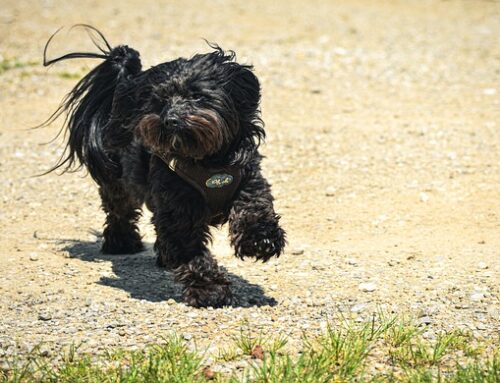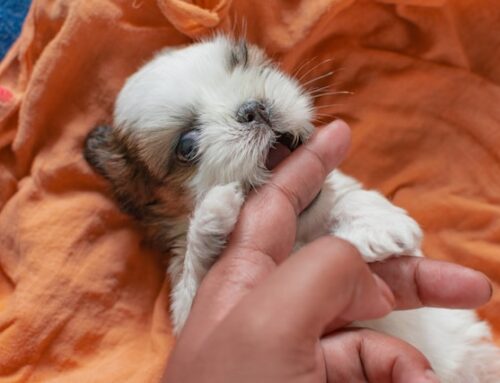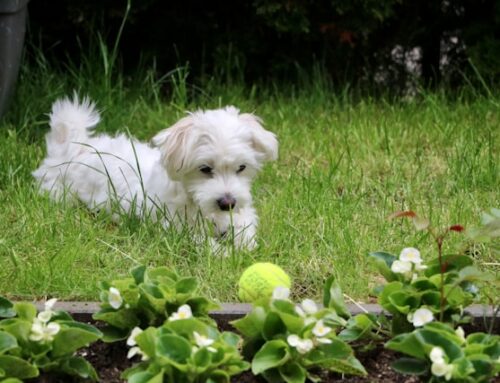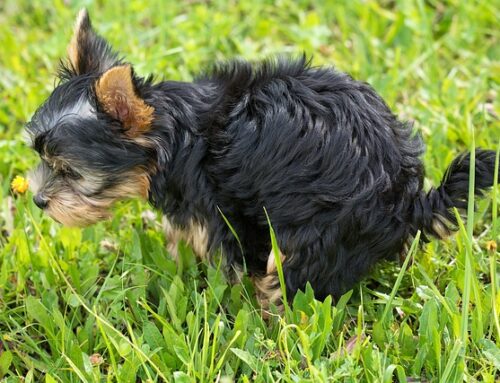Introduction to Bichon Frise Behavior
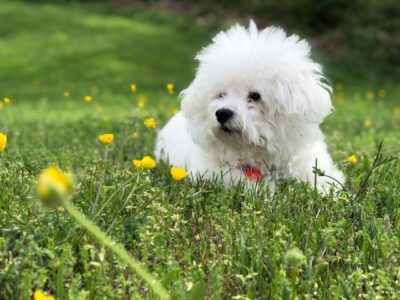
Welcome to our comprehensive guide on understanding Bichon Frise behavior. Bichon Frises, often referred to as “Bichons,” are a charming and affectionate breed that has captured the hearts of dog lovers worldwide. Known for their fluffy white coats and cheerful demeanor, Bichon Frises are a joy to be around and make wonderful companions for families, singles, and seniors alike.
In this guide, we’ll explore the unique characteristics and the Bichon Frise behavior traits that define the Bichon Frise breed. From their playful antics to their social nature, we’ll take an in-depth look at what makes these dogs so special. Whether you’re a proud Bichon Frise owner or simply curious about this delightful breed, this guide will provide valuable insights into their temperament, behavior, and overall personality.
Throughout this guide, we’ll also discuss how to best care for your Bichon Frise, including tips on training, grooming, and socialization. Understanding your Bichon Frise behavior is key to building a strong bond with your furry friend and ensuring they live a happy and healthy life.
So, join us as we dive into the world of Bichon Frise dogs and uncover the delightful quirks and endearing traits that make them such beloved companions. Whether you’re searching for information on Bichon Frise temperament, exploring different dog breeds, or simply curious about the Bichon Frise dog breed, this guide has you covered.
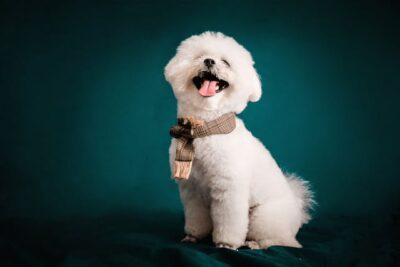
Brief overview of the Bichon Frise breed
The Bichon Frise is a small dog breed known for its cheerful temperament and fluffy, white coat. This breed is part of the non-sporting group of dog breeds and is prized for its friendly nature and affectionate personality.
Bichon Frises are often described as charming and playful, making them excellent companions for families and individuals alike. Their happy demeanor and love for attention make them a popular choice for therapy work and as emotional support animals. Understanding Bichon Frise behavior is key to nurturing their loving nature and outgoing personality.
Overall, the Bichon Frise is a delightful dog breed known for its loving nature and outgoing personality.
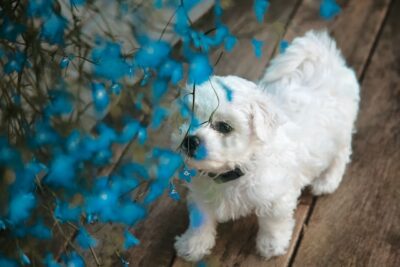
Importance of understanding Bichon Frise behavior
Understanding Bichon Frise behavior is crucial, especially when caring for a Bichon Frise puppy. This breed is known for its playful and affectionate nature, but they also have specific needs and behaviors that require attention.
By understanding their temperament, owners can provide appropriate training, socialization, and care from a young age, setting a foundation for a well-behaved adult dog.
Additionally, understanding Bichon Frise behavior helps owners anticipate and address any potential behavioral issues early on, ensuring a happy and healthy relationship between the puppy and its family.
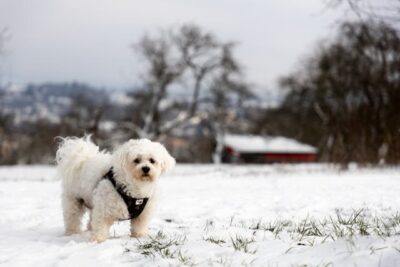
History and Origin of the Bichon Frise
Historical background of the breed
The Bichon Frise has a rich history dating back to ancient times, believed to have originated from the Mediterranean region. These dogs were popular among nobles and sailors for their cheerful temperament and hypoallergenic coats.
The breed’s name “Bichon Frisé” is derived from the French phrase meaning “curly lap dog,” highlighting their distinctive curly coats. In the 14th century, Italian sailors introduced Bichons to Europe, where they became favorites of the French and Spanish royalty.
During the French Revolution, Bichon Frises faced a decline in popularity as their association with the aristocracy led to their neglect and abandonment. However, the breed survived and regained popularity in the following centuries.
Historically, Bichon Frises were believed to have been brought to the Canary Islands by sailors, where they further developed into the breed we know today.
The Bichon Frise was officially recognized by the American Kennel Club (AKC) in 1972 as a member of the non-sporting dog breed group. Today, Bichon Frises are cherished as family pets and are known for being generally healthy dogs with a lively and affectionate nature.
They are also popular participants in dog shows and are supported by dedicated Bichon Frise clubs worldwide. Understanding Bichon Frise behavior is important for providing them with the proper care and training they need to thrive in a loving home environment.
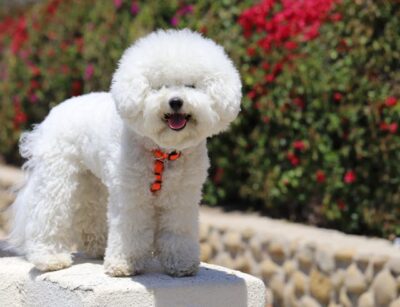
Influence of the breed’s history on its behavior today.
The Bichon Frise, a breed renowned for its intelligence and charm, has a fascinating history that influences its behavior today.
Originating from the Mediterranean region, these dogs were favored by royalty and nobility, known for their playful nature and affectionate demeanor. The breed’s name, “Bichon Frisé,” translates to “curly lap dog,” reflecting its role as a beloved companion. Today, Bichon Frises are cherished family pets, thanks to their adaptability and friendly disposition.
Understanding Bichon Frise behavior is key to providing them with the care and training they need to thrive. Joining a Bichon Frise club can provide valuable insights into the breed’s history and characteristics, enhancing your understanding and appreciation of these delightful dogs.
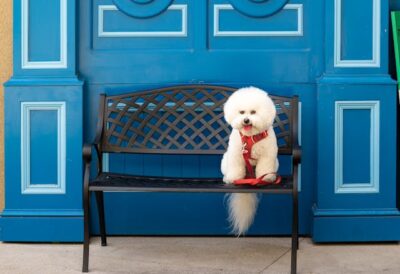
Breed Characteristics
Physical characteristics of the Bichon Frise
The Bichon Frise is characterized by its distinctive curly coat, which is hypoallergenic and does not shed much.
These small dogs typically weigh between 10 to 18 pounds and have a life expectancy of 12 to 15 years. Their body temperature is similar to other breeds, ranging from 100.5 to 102.5 degrees Fahrenheit.
The Bichon Frise’s coat requires regular grooming to prevent matting and maintain its signature fluffy appearance.

Behavioral traits commonly found in Bichon Frises
The Bichon Frise is characterized by its distinctive curly coat, which is hypoallergenic and does not shed much, making them a great choice for allergy sufferers. These small dogs typically weigh between 10 to 18 pounds and have a life expectancy of 12 to 15 years.
Their body temperature is similar to other breeds, ranging from 100.5 to 102.5 degrees Fahrenheit. Due to their non-shedding coat, the Bichon Frise’s grooming needs are focused on preventing matting and maintaining its signature fluffy appearance.
Understanding Bichon Frise behavior is important for providing them with the proper care and training they need to thrive in a loving home environment.
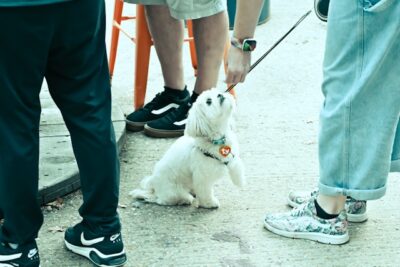
Bichon Frise Behavior and Temperament
Overview of the Bichon Frise Behavior and Temperament
Bichon Frises are known for their intelligence, often picking up on commands and tricks quickly. While they are generally a cheerful and affectionate breed, they can develop excessive barking habits if not properly trained or if they are bored or anxious.
Due to their social nature, Bichon Frises may not do well when left alone for long periods, as they thrive on companionship and may become anxious or develop separation anxiety.
Understanding their need for interaction and mental stimulation is key to ensuring a happy and well-adjusted Bichon Frise. Observing and learning about Bichon Frise behavior can help owners address these issues effectively.
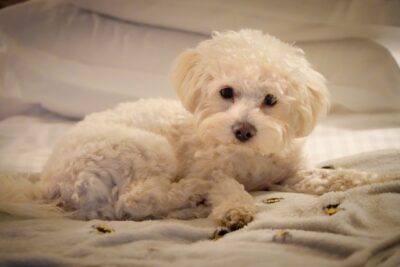
Factors that influence temperament in Bichon Frises
Several factors can influence the temperament of Bichon Frises. Leaving them alone for long periods of time can lead to undesirable behaviors, as they are a breed that thrives on companionship and can become anxious or bored without interaction.
Mental stimulation is crucial for this breed, as they are intelligent and need to be engaged to prevent boredom-related issues. Bichon Frises are also known for being vocal dogs, often expressing themselves through barking, especially when they are not adequately stimulated.
Ensuring they receive enough exercise and mental enrichment can help mitigate these tendencies and foster a well-rounded and happy temperament. Understanding Bichon Frise behavior can help owners provide the necessary care and environment for their dogs’ well-being.
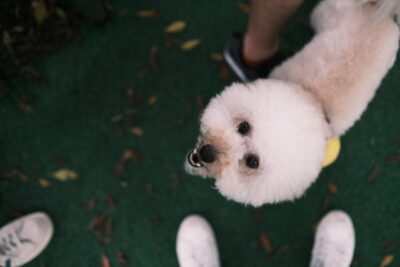
Social Behavior
Bichon Frises as social animals.
Bichon Frises are inherently social animals, known for their friendly and outgoing nature. They tend to be active dogs and enjoy interacting with their owners and other pets. Their intelligence makes them quick to adapt to various social situations, including interactions with other dog breeds.
However, their vocal tendencies mean they may express themselves through barking during social interactions.
With proper training and socialization, Bichon Frises can be excellent companions for both humans and other animals. Understanding Bichon Frise behavior is crucial for providing them with the right socialization and training to thrive in various social environments.
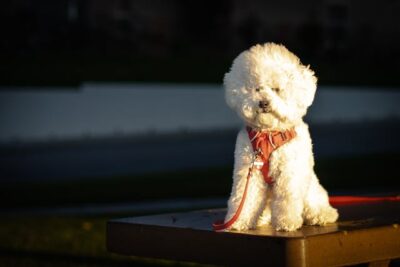
Tips for socializing your Bichon Frise
Socializing your Bichon Frise is essential for their well-being and behavior. Start early by introducing them to various people, pets, and environments to help them become more adaptable.
Since Bichon Frises are smart, engage them in positive training experiences to reinforce good behavior around others. As pet parents, be patient and consistent in your socialization efforts, rewarding your Bichon for calm and friendly behavior.
Regular socialization can help your Bichon Frise grow into a well-adjusted and sociable companion. Understanding Bichon Frise behavior is key to successful socialization, ensuring they develop positive interactions with others.
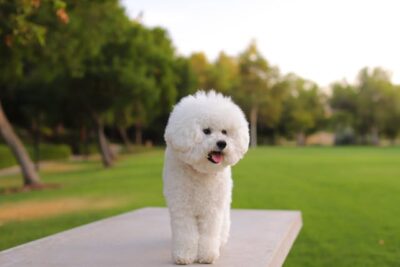
Behavioral Development Stages
Puppyhood Bichon Frise Behavior and Milestones.
In the early stages of development, Bichon Frise dogs exhibit typical puppy behaviors such as exploration, playfulness, and learning.
This period is crucial for their socialization and training. As a vocal dog breed, Bichon Frises may start to develop their barking habits at an early age, which can be managed through positive reinforcement and proper training.
Understanding these developmental milestones can help pet parents provide the necessary guidance and care for their Bichon Frise puppies as they grow into well-behaved and social adults.
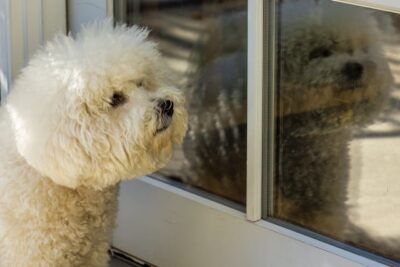
Adolescent and adult Bichon Frise behavior changes
As Bichon Frise dogs transition from adolescence to adulthood, their behavior may change in various ways. They may become more settled and less hyperactive compared to their puppyhood.
However, their vocal tendencies as a breed may still be present, requiring consistent training and management. Additionally, as they age, Bichon Frises may experience changes in their weight and energy levels, necessitating adjustments in their diet and exercise routines.
Understanding these behavioral changes and providing appropriate care can help ensure a happy and healthy life for Bichon Frise dogs.
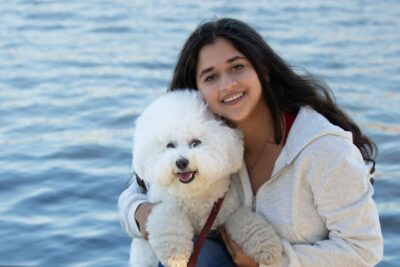
Communication Methods
Understanding Bichon Frise vocalizations
Bichon Frises, like many companion dogs, communicate through various vocalizations to convey their needs and emotions to other dogs and pet owners. Understanding these vocal cues can help pet owners better interpret their Bichon Frise behavior and respond appropriately.
Many Bichons use barking, whining, and growling to express excitement, fear, or a desire for attention or companionship. By paying attention to these vocal signals, pet owners can strengthen their bond with their Bichon Frise and ensure a harmonious relationship.
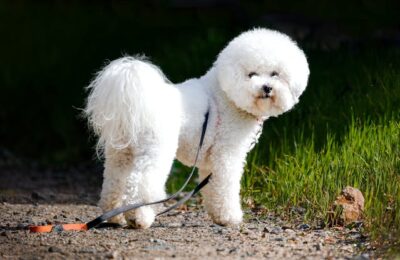
Body language and its meanings
Body language is a crucial form of communication for Bichon Frises and other dogs, as well as for interacting with other pets. A wagging tail often indicates happiness and excitement, while a tucked tail can signal fear or submission.
Raised hackles may suggest agitation or defensiveness, while relaxed posture and soft eyes indicate comfort and contentment.
Understanding these subtle cues can help pet owners interpret their Bichon Frise’s feelings and respond appropriately, facilitating positive interactions with other dogs and pets.
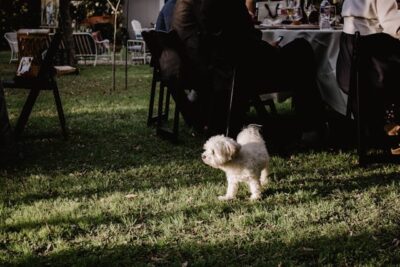
Common Behavioral Issues
Separation anxiety and how to address it
Separation anxiety is a common behavioral issue in small breeds like the Bichon Frise and can manifest as excessive barking, destructive behavior, or inappropriate elimination when left alone.
To address this, providing mental and physical stimulation before leaving can help tire the dog mentally and physically, making them more likely to rest in your absence. Creating a safe and comfortable environment, using calming aids such as music or pheromone diffusers, and gradually desensitizing the dog to your departure can also be effective strategies.
Consulting with a professional trainer or behaviorist can provide tailored advice for managing separation anxiety in your Bichon Frise.
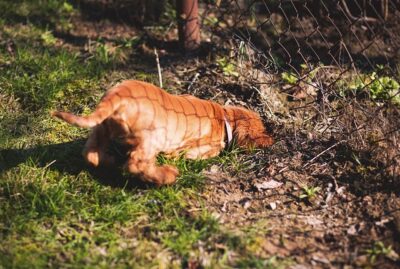
Barking, digging, and other behavioral problems
Bichon Frises, like other dogs, may exhibit barking, digging, and other behavioral problems, especially if they are not properly stimulated or trained.
Providing regular exercise and mental stimulation through activities like dog sports can help channel their energy in a positive way.
Socializing them with other dog breeds and their same breed can also prevent boredom and reduce behavioral issues.
Consistent training and positive reinforcement can address these problems, ensuring a well-behaved and happy Bichon Frise.
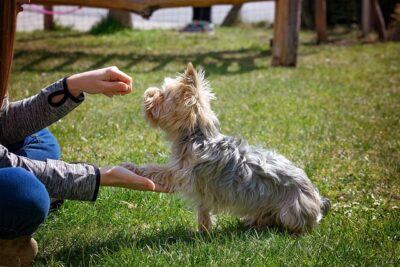
Training and Obedience
Training tips for Bichon Frise puppies
When training Bichon Frise puppies, start early with crate training and basic obedience commands. Use positive reinforcement methods and reward good behavior with treats or praise.
Consistency is key, so establish a regular training routine and stick to it. Incorporate a variety of training methods to keep your puppy engaged and interested. With patience and positive rewards, your Bichon Frise puppy will learn quickly and become a well-behaved companion.
It is best to start puppy training early because it is crucial for establishing good behavior habits that will last a lifetime.
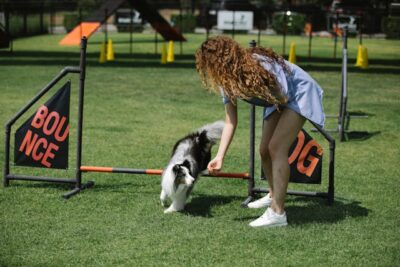
Obedience training for adult Bichon Frises.
Obedience training for adult Bichon Frises builds on their intelligence and ability to learn quickly.
Focus on reinforcing basic commands and addressing any behavioral issues that may have developed.
Since Bichon Frises are prone to weight gain, incorporate regular exercise into their training routine to keep them fit and healthy.
Use positive reinforcement methods to encourage good behavior and maintain a strong bond with your adult Bichon Frise.
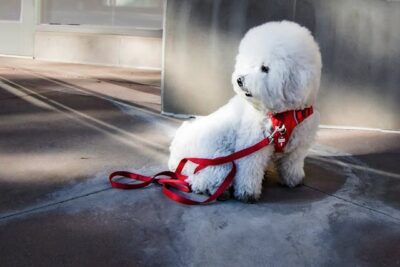
Exercise and Activity Needs
Importance of regular exercise for Bichon Frises
Regular exercise is crucial for Bichon Frises to maintain a healthy weight and overall well-being, regardless of their age. Engaging in physical activities like walks, playtime, and interactive games helps prevent obesity and related health issues.
Additionally, exercise provides mental stimulation, which is essential for their intelligence and happiness. By incorporating regular exercise into their routine, pet owners can ensure that their Bichon Frises lead active and fulfilling lives.
Suitable exercise routines for different ages
For Bichon Frises, suitable exercise routines vary depending on their age. Puppies require shorter, more frequent play sessions to avoid overexertion. As they grow, gradually increase the length and intensity of their activities.
Adult Bichons benefit from regular walks and playtime to maintain a healthy weight and stay active. Senior Bichons may need shorter and less strenuous activities to accommodate their age and any health issues. Adjusting the exercise routine based on age ensures that Bichon Frises remain healthy and happy throughout their lives.

Feeding and Nutrition
Dietary needs of Bichon Frises
Bichon Frises require a high-quality dog food to meet their dietary needs and maintain a healthy weight. Look for a food specifically formulated for small breeds to ensure it contains the right balance of nutrients. Portion control is crucial, as Bichons are prone to overeating and obesity.
Consider their age, size, and activity level when determining the appropriate amount to feed them. Regular veterinary check-ups can help monitor their weight and adjust their diet as needed.

Feeding schedule and portion control
Establishing a regular feeding schedule and practicing portion control are key to maintaining a healthy weight for Bichon Frises.
Divide their daily food intake into two or three meals to prevent overeating. Measure their food according to their weight, age, and activity level, and adjust portions as needed to avoid obesity.
Monitoring their weight and body condition regularly can help ensure they are receiving the right amount of food.
Consulting with a veterinarian can provide guidance on the appropriate feeding schedule and portion sizes for your Bichon Frise.
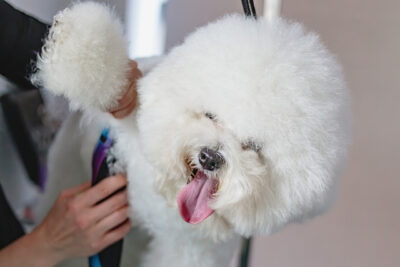
Grooming and Hygiene
Coat care tips for Bichon Frises
Proper coat care is essential for Bichon Frises, including regular grooming to prevent matting and tangles. Consider taking them to a professional groomer every 4-6 weeks for a trim and full grooming session.
Pay special attention to their floppy ears, which can trap moisture and become a breeding ground for bacteria and yeast if not kept clean and dry. Regularly check and clean their ears to prevent infections.
Despite their fluffy appearance, Bichon Frise shed very little, making them a great choice for those with allergies or who prefer a clean home. Regular grooming not only keeps your Bichon looking their best but also contributes to their overall health and well-being.
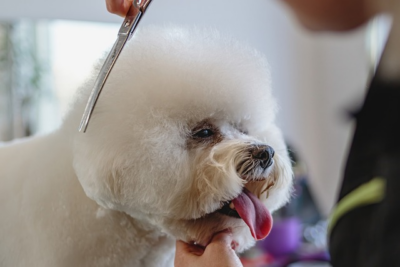
Bathing, brushing, and grooming routine
Maintaining a regular grooming routine for your Bichon Frise is crucial, especially for allergy sufferers. Bathe your Bichon every 3-4 weeks using a mild dog shampoo to keep their coat clean and free of allergens.
Regular brushing is also important to prevent matting and tangles, especially in areas like the ears and tail.
Consider taking your Bichon to a professional groomer every 4-6 weeks for a trim and to ensure their coat is properly maintained. Pay special attention to their floppy ears, keeping them clean and dry to prevent infections.

Health and Wellness
Common health issues in Bichon Frises
Bichon Frises are prone to several common health issues, including bladder stones, dental disease, gum infections, and ear infections. Bladder stones can form due to diet or genetics and may require veterinary intervention.
Dental disease and gum infections can develop without proper dental care, so regular brushing and dental check-ups are important. Ear infections can occur due to their floppy ears, which can trap moisture and debris.
Regular visits to a small animal veterinarian can help prevent and address these health issues, ensuring a happy and healthy Bichon Frise. If you suspect your dog has a gum infection, it’s important to seek veterinary care promptly to prevent complications.
Tips for maintaining your Bichon Frise’s health
To maintain your Bichon Frise’s health, provide regular exercise suitable for their age and weight to prevent obesity. Feed them a balanced diet tailored to their nutritional needs and avoid overfeeding.
Schedule regular check-ups with a veterinarian to monitor their health and address any potential issues early. Practice good dental hygiene by brushing their teeth regularly and providing dental treats or toys. Regular grooming and ear cleaning can also help prevent skin and ear infections.
Environmental Enrichment
Creating a stimulating environment for your Bichon Frise
Creating a stimulating environment for your Bichon Frise can enhance their overall well-being. Provide a variety of toys, puzzles, and interactive games to keep them mentally engaged. Rotate their toys regularly to prevent boredom and keep them interested.
Incorporate daily walks and outdoor playtime to provide physical exercise and mental stimulation. Consider enrolling them in dog sports or training classes to challenge their intellect and improve their bond with you.
Toys and activities to keep your Bichon Frise engaged
To keep your Bichon Frise engaged, provide a variety of toys that cater to their playful nature, such as squeaky toys, chew toys, and interactive puzzle toys. Rotate their toys regularly to keep them interesting and prevent boredom.
Engage in activities like hide-and-seek or fetch to stimulate their mind and body. Consider puzzle feeders or treat-dispensing toys to encourage mental stimulation while eating. Incorporating these toys and activities into your Bichon’s routine can help keep them happy, active, and mentally sharp.

Traveling with Your Bichon Frise
Tips for traveling safely with your Bichon Frise
When traveling with your Bichon Frise, ensure their safety by using a secure and comfortable pet carrier or harness. Plan regular breaks during long trips to allow your Bichon to stretch, relieve themselves, and stay hydrated.
Keep their travel essentials handy, including food, water, bowls, leash, waste bags, and any necessary medications. Acclimate your Bichon to car travel gradually, starting with short trips and gradually increasing the duration. Lastly, never leave your Bichon unattended in a vehicle, especially in hot weather, as they are sensitive to heat.
Travel essentials for Bichon Frises
When traveling with your Bichon Frise, it’s important to pack their travel essentials. These include a sturdy and comfortable carrier or harness, a leash, collar with identification tags, food and water bowls, enough food for the duration of the trip, treats, waste bags, grooming supplies, any necessary medications, and a familiar blanket or toy for comfort.
Additionally, bring along copies of your Bichon’s medical records and ensure they are up-to-date on vaccinations. These essentials will help keep your Bichon safe, comfortable, and happy during your travels.
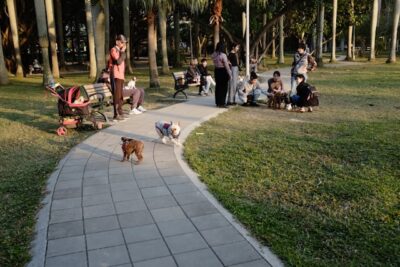
Bichon Frise Community and Resources
Connecting with other Bichon Frise owners
Connecting with other Bichon Frise owners can be a rewarding experience and provide valuable resources. Joining a Bichon Frise club or kennel club, such as the American Kennel Club (AKC) Bichon Frise Club, can offer opportunities to meet fellow enthusiasts, attend events, and participate in activities tailored to the breed.
Online forums and social media groups dedicated to Bichon Frises are also great places to connect with owners, share experiences, and seek advice. These communities can provide support, friendship, and a wealth of knowledge for Bichon Frise owners.
Recommended books, websites, and forums for Bichon Frise enthusiasts
For Bichon Frise enthusiasts seeking more information and resources, several books, websites, and forums can be valuable. Books like “Bichon Frise book” by Juliette Cunliffe and “The Bichon Frise: An Owner’s Guide to a Happy Healthy Pet” by Kathie Vogel and Mary Vogel provide comprehensive insights into the breed’s care, training, and history.
Websites such as the Bichon Frise Club of America (BFCA) and the American Kennel Club (AKC) Bichon Frise breed page offer breed-specific information, events, and breeder referrals. Forums like BichonFriseDogs.com and Bichon.org provide platforms for enthusiasts to share experiences, seek advice, and connect with other Bichon Frise owners.
Conclusion to Bichon Frise Behavior
Recap of key points in understanding Bichon Frise behavior
- Bichon Frises are charming and affectionate dogs known for their fluffy white coats and cheerful demeanor, making them wonderful companions for families, singles, and seniors alike.
- Their playful antics and social nature are defining characteristics, making them adaptable to various social situations and great for therapy work and as emotional support animals.
- Understanding their behavior is crucial for providing appropriate training, socialization, and care from a young age, setting a foundation for a well-behaved adult dog.
- Bichon Frises have a rich history dating back to ancient times, originating from the Mediterranean region and later favored by European nobility and royalty.
- Their intelligence and charm are influenced by their historical role as companions, and joining a Bichon Frise club can provide valuable insights into their breed’s history and characteristics.
- Bichon Frises have distinctive physical characteristics, including their curly coat, small size (10 to 18 pounds), and life expectancy of 12 to 15 years, with grooming needs focused on preventing matting and maintaining their fluffy appearance.
- Behaviorally, Bichon Frises are known for being active and vocal, with a tendency to bark if not properly trained or stimulated, making regular exercise and mental enrichment important for their well-being.
- Their temperament is friendly and outgoing, making them excellent companions for both humans and other pets, but they may develop separation anxiety if left alone for long periods.
- Understanding their vocalizations, body language, and developmental stages is key to interpreting their needs and fostering a strong bond with them.
- Providing a stimulating environment, regular exercise, proper grooming, and nutrition are essential for maintaining their health and happiness.
Importance of meeting the breed’s behavioral needs
Meeting the behavioral needs of Bichon Frises is crucial for their overall well-being and happiness. Neglecting these needs can lead to behavioral issues and a less fulfilling life for the dog. Proper training, socialization, and mental stimulation from a young age are essential for ensuring that Bichon Frises grow into well-behaved and balanced adults.
Understanding their need for companionship and interaction is key to preventing separation anxiety and other behavioral problems that can arise when they are left alone for extended periods. Providing regular exercise, grooming, and proper nutrition are also important aspects of meeting their behavioral needs, as they contribute to their physical health and mental stimulation.
Ultimately, meeting the breed’s behavioral needs not only enhances the bond between the owner and the dog but also ensures that the Bichon Frise lives a happy, healthy, and fulfilling life. Observing and addressing Bichon Frise behavior can help owners meet these needs effectively.
If you’re interested in adding a Bichon Frise to your family, consider our Bichon Frise puppies for sale in Ohio and surrounding areas. Our puppies are thoughtfully bred from reputable breeders and are raised with care and love. They are not just pets; they are healthy, friendly, and cherished members of our family.
We guarantee that your new family member will exceed your expectations, bringing joy and companionship into your home. Our puppies love children and are well-socialized, ensuring they are ready to become a beloved part of your family.
Frequently Asked Questions (FAQs) About Bichon Frise Behavior
- Are Bichon Frise smart?
- Yes, Bichon Frises are known for their intelligence. They are quick learners and can excel in obedience training and learning tricks.
- Do Bichon Frise shed?
- Bichon Frises are considered a low-shedding breed, making them a good choice for allergy sufferers. However, regular grooming is still necessary to prevent matting and maintain their coat.
- How should I train my Bichon Frise puppy?
- Start puppy training early to establish good habits. Use positive reinforcement methods and be patient, as Bichon Frises can be sensitive to harsh training techniques.
- Can Bichon Frises live in apartments?
- Yes, Bichon Frises are well-suited for apartment living. They are small dogs that adapt well to indoor environments, but they still need regular exercise and mental stimulation.
- How do I socialize my Bichon Frise?
- Socialization should start at an early age and include exposure to different people, animals, and environments. This helps them become well-rounded and confident dogs.
- Do Bichon Frises get along with other pets?
- Bichon Frises are generally friendly and can get along well with other pets, especially if they are socialized properly from a young age.
- How much exercise does a Bichon Frise need?
- Bichon Frises are active dogs but don’t require a lot of exercise. Daily walks and playtime in a fenced yard are usually sufficient to keep them happy and healthy.
- Are Bichon Frises good for first-time dog owners?
- Yes, Bichon Frises can be a good choice for first-time dog owners due to their friendly nature and adaptability. However, they still require commitment to training and care.
- Do Bichon Frises have separation anxiety?
- Bichon Frises can be prone to separation anxiety, so it’s important to gradually accustom them to being alone for short periods from an early age and provide them with plenty of mental stimulation.
- How long do Bichon Frises live?
- Bichon Frises have a relatively long lifespan for a small dog breed, typically living between 12 to 15 years or even longer with proper care.

